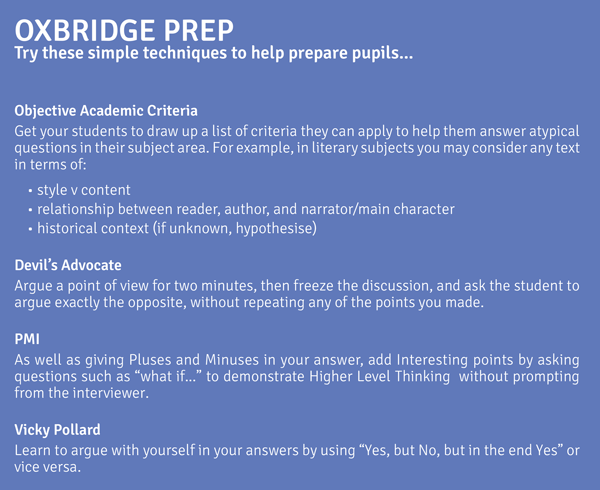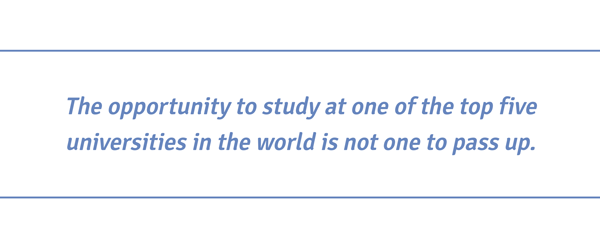Great Britain is world renowned for its quality exports, including financial services, aerospace industry and car manufacturing, to name but a few. However, many people abroad would add a high-quality education system to that list — yes really!
Part of our high quality education system is our universities and at the top of the pile sit Oxford and Cambridge, 3rd and 5th on the global list1. In fact they are the only two universities outside the US in the world top ten.
We should be proud of this achievement and yet many in the UK still persist in shrouding Oxbridge in a cloud of elitism and anachronism.
What is different about Oxbridge?
The style of teaching at Oxbridge is unique. Very few other UK courses can offer a weekly tutorial in which you sit down with your tutor and have him / her analyse your work word by word.
I should add that your tutor is probably a world-leading expert on the topic and may well have written the text book you studied at A-Level.
The collegiate system also offers something different. You have the best of both worlds. You are of course a member of a university with all the teaching and co-curricular opportunities size provides. But as a member of a college as well you benefit from being part of a much smaller community, maybe not too dissimilar in size to a Sixth Form.
Demystifying the application process
Gaining a place involves jumping through more hoops than applications to other universities, but, contrary to myth, there are rarely any absolute requirements — you don’t need a certain number of A* grades at GCSE.
Similarly Oxbridge looks closely at context — a student applying from a school or area that has little or no historical success with applications will jump through lower hoops than a student from a school with a long established Oxbridge preparation programme2.
Oxbridge apply rather a scientific process to applications. They rank each student against their fellow applicants at each stage of the process:
-
• School reference and predicted grades
• Personal statement
• GCSE results
• AS results (including UMS for Cambridge)
• Pre-selection tests such as BMAT, TSA, LNAT; or tests taken at interview
• Interviews
Then they make offers to the top candidates across the board (an average of 1 in 5 applicants).
On the plus side it means you don’t have to be top of the pile for each section. It also dismisses the belief still held by many that great exam results alone should be enough.
Oxbridge turn down thousands of students every year who go on to achieve A*/A’s at A level3.
So how do you prepare your students?
How to prepare students for the unpreparable
Twenty years into my professional life and my Cambridge interviews are still the hardest few hours of my life, and yet also amongst the most enjoyable.
The standard Oxbridge interview (if there is such a thing) often starts with questions around a topic that the student is familiar with, most commonly from their personal statement. However the interviewers only really start assessing a student’s potential when they get them onto new ground.
The ability to think on your feet and to apply your existing knowledge to a new area is what they are measuring above all. This, I believe, should be at the centre of how teachers help students to prepare.
Why bother applying?
One of my greatest fears is that there are still large numbers of bright and enthusiastic students out there who do not apply because they think it isn’t for them, or they aren’t from the right background and they won’t fit in.
My highlight of the last year was working with students at the new London Academy of Excellence in Newham. Amongst many impressive students was a lad who had done GCSEs at a school with a 30% pass rate. He had taught himself Spanish from scratch to gain an A* at the end of Year 10, he then taught it to five of his mates in Year 11 — they all passed. Cambridge snapped him up. The opportunity to study at one of the top five universities in the world is not one to pass up.
There are benefits to going through the whole process, even if for most applicants it does not end in success. And for those that do gain a place, like our superstar linguist at the LAE, they have at least three years of indulging their passion for learning with other like-minded young people to look forward to. SR




